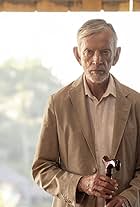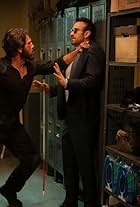lassegalsgaard
März 2016 ist beigetreten
Willkommen auf neuen Profil
Wir arbeiten immer noch daran, einige Profilfunktionen zu aktualisieren. Um die Kennzeichnungen, Bewertungsaufschlüsselungen und Umfragen zu diesem Profil zu sehen, rufe bitte vorherige Version auf.
Bewertungen1991
Bewertung von lassegalsgaard
Rezensionen711
Bewertung von lassegalsgaard
The Empire has always loomed large over the "Star Wars" galaxy - a monolithic force of control, fear, and ironclad authority. From the first moments we encountered them, we were told about their cruelty, their chokehold over worlds, and the suffocating weight of their dominance. But it wasn't until "Andor" that we truly began to see what that meant. This series hasn't just expanded on the myth of Imperial power; it's redefined it, presenting a more insidious, grounded version of tyranno - one that is more dangerous precisely because of how real it feels. Through cold boardrooms, morally grey alliances, and devastating civilian consequences, "Andor" has become a story as much about the dangers of unchecked power and authoritarianism as it is about the spaceships and shootouts that made the galaxy far, far away so iconic. Season 3, Episode 3, titled "Harvest," continues to prove just how essential this series is - not only to "Star Wars" lore but to the very idea of storytelling in a political landscape. This episode further intensifies the show's commitment to portraying the Empire not just as a villain, but as a system - a brutal, calculated machine that preys on the innocent, the desperate, and even those within its own ranks. We witness the unraveling impact of Imperial control on lives scattered across the stars, and how even the agents of that control - like Dedra Meero and Syril Karn - are caught in a twisted dance of ambition, humiliation, and compliance.
What makes "Harvest" so compelling is its story and themes. Tony Gilroy's script keeps pushing the narrative forward by exploring the emotional and physical cost of rebellion, oppression, and survival. Whether it's through Cassian's desperate efforts to protect those he loves or Luthen's cold-blooded pragmatism in silencing potential threats, the episode reminds us that in a galaxy ruled by fear, trust becomes its own battleground. Innocent systems like Mina-Rau continue to be crushed beneath the Empire's boot, and even as resistance grows, the desperation among civilians becomes palpable - not just from the cruelty of their oppressors, but from the actions of those who claim to fight for them.
The tone and tension remain razor sharp. The cruelty of the Empire isn't just discussed - it's felt. It pulses through a dinner scene that's as emotionally claustrophobic as any battle, and it erupts in moments of violence that are sudden, visceral, and horrifying. The political pressure is as fierce as ever, with secret deals and hard choices surrounding Mon Mothma and Luthen, while on the front lines, lives are being torn apart. The tension here isn't just in whether the good guys win - it's in wondering if there's even such a thing anymore.
The character development is masterful. Bix Caleen, already one of the show's most tragic figures, faces a moment that deepens her trauma and reminds us just how much she has suffered. Adria Arjona continues to deliver a quietly devastating performance, and her pain feels earned. Mon Mothma, brilliantly portrayed by Genevieve O'Reilly, balances sorrow and diplomacy as the cost of her rebellion grows heavier. Meanwhile, Dedra and Syril's dynamic continues to twist into something uniquely uncomfortable, with their dinner sequence offering an intimate look at the emotional manipulation at play - not just between them, but from Syril's mother, Eedy, whose presence remains disturbingly effective. Each of these characters feels like they're evolving because of their circumstances, not in spite of them.
Visually, "Harvest" is stunning. Director Ariel Kleiman brings an elegance to the chaos. The show's minimal use of the Volume continues to pay off, grounding scenes in tactile, physical environments that feel real. The editing is sharp, especially during the euphoric Chandrilan dance sequence, which is hauntingly intercut with the violence and collapse happening elsewhere. It's a stark contrast that elevates the entire episode, emphasizing how disconnected privilege can be from pain, and how celebration can occur alongside atrocity - if only you look away long enough.
"Andor" remains a triumph. With "Harvest," the series digs even deeper into what rebellion really means - and what it costs. It's complex, gripping, and unflinchingly honest. If "Star Wars" is about hope, "Andor" is about the price you pay to keep it alive.
What makes "Harvest" so compelling is its story and themes. Tony Gilroy's script keeps pushing the narrative forward by exploring the emotional and physical cost of rebellion, oppression, and survival. Whether it's through Cassian's desperate efforts to protect those he loves or Luthen's cold-blooded pragmatism in silencing potential threats, the episode reminds us that in a galaxy ruled by fear, trust becomes its own battleground. Innocent systems like Mina-Rau continue to be crushed beneath the Empire's boot, and even as resistance grows, the desperation among civilians becomes palpable - not just from the cruelty of their oppressors, but from the actions of those who claim to fight for them.
The tone and tension remain razor sharp. The cruelty of the Empire isn't just discussed - it's felt. It pulses through a dinner scene that's as emotionally claustrophobic as any battle, and it erupts in moments of violence that are sudden, visceral, and horrifying. The political pressure is as fierce as ever, with secret deals and hard choices surrounding Mon Mothma and Luthen, while on the front lines, lives are being torn apart. The tension here isn't just in whether the good guys win - it's in wondering if there's even such a thing anymore.
The character development is masterful. Bix Caleen, already one of the show's most tragic figures, faces a moment that deepens her trauma and reminds us just how much she has suffered. Adria Arjona continues to deliver a quietly devastating performance, and her pain feels earned. Mon Mothma, brilliantly portrayed by Genevieve O'Reilly, balances sorrow and diplomacy as the cost of her rebellion grows heavier. Meanwhile, Dedra and Syril's dynamic continues to twist into something uniquely uncomfortable, with their dinner sequence offering an intimate look at the emotional manipulation at play - not just between them, but from Syril's mother, Eedy, whose presence remains disturbingly effective. Each of these characters feels like they're evolving because of their circumstances, not in spite of them.
Visually, "Harvest" is stunning. Director Ariel Kleiman brings an elegance to the chaos. The show's minimal use of the Volume continues to pay off, grounding scenes in tactile, physical environments that feel real. The editing is sharp, especially during the euphoric Chandrilan dance sequence, which is hauntingly intercut with the violence and collapse happening elsewhere. It's a stark contrast that elevates the entire episode, emphasizing how disconnected privilege can be from pain, and how celebration can occur alongside atrocity - if only you look away long enough.
"Andor" remains a triumph. With "Harvest," the series digs even deeper into what rebellion really means - and what it costs. It's complex, gripping, and unflinchingly honest. If "Star Wars" is about hope, "Andor" is about the price you pay to keep it alive.
The first season of "Andor," along with the powerful opening episode of this new season, has shown an exceptional ability to weave together seemingly disparate stories, locations, and characters into a tightly connected web. Each tread - whether political, personal, or insurgent - pulses with purpose, drawing viewers into a "Star Wars" narrative unlike any other. This episode continues that tradition, though with a slightly more elusive rhythm. There's a lot at stake across the galaxy, and while all the pieces clearly matter, their connections feel more hinted at than fully realized in this chapter. Still, "Sagrona Teema" holds tensions beautifully, using uncertainty as both a narrative device and a reflection of the characters' spiraling circumstances.
This episode leans heavily into the theme of fractured stability - in rebel cells, in political alliances, in personal relationships. Each setting brings its own flavor of tension, and although these subplots unfold in isolation, there's a clear undercurrent tying them together: no one is safe, and no one truly knows what's coming. The storytelling keeps you on edge, especially because it refuses to offer easy answers. Cassian's storyline, while gripping, feels the most removed - raising questions about how it fits into the larger tapestry. Where "Andor" continues to shine is in its intelligent, slow-burn portrayal of political warfare. This episode is steeped in bureaucracy and social maneuvering, yet it's never dull. The suspense grows not from shootouts but from the terrifying weight of political surveillance, social expectations, and moral compromise. Mon Mothma walks a razor-thin line as she balances her public role with private rebellion, and Dedra Meero, now in an unexpected domestic situation with Syril Karn, finds herself navigating politics not just at work but in her personal life. What sets "Andor" apart from other entries is its devotion to character depth and emotional realism. Here, the Imperial threat doesn't manifest through vast armies or destruction, but through quiet dread, the kind that seeps into conversations and decisions. Brasso, Bix, and Will's subplot, for example, crackles with fear and urgency as they prepare for an audit that could ruin their lives. It's mature storytelling in every sense, where personal choices ripple across a galaxy on the brink.
"Sagrona Teema" might not tie every thread together as cleanly as some viewers might expect, but that ambiguity works in its favor. The result is an episode that lingers - heavy with mood, rich in character, and bursting with potential. As always, "Andor" trusts its audience to sit with the discomfort and trust the story will come together. So far, it's earned that trust.
This episode leans heavily into the theme of fractured stability - in rebel cells, in political alliances, in personal relationships. Each setting brings its own flavor of tension, and although these subplots unfold in isolation, there's a clear undercurrent tying them together: no one is safe, and no one truly knows what's coming. The storytelling keeps you on edge, especially because it refuses to offer easy answers. Cassian's storyline, while gripping, feels the most removed - raising questions about how it fits into the larger tapestry. Where "Andor" continues to shine is in its intelligent, slow-burn portrayal of political warfare. This episode is steeped in bureaucracy and social maneuvering, yet it's never dull. The suspense grows not from shootouts but from the terrifying weight of political surveillance, social expectations, and moral compromise. Mon Mothma walks a razor-thin line as she balances her public role with private rebellion, and Dedra Meero, now in an unexpected domestic situation with Syril Karn, finds herself navigating politics not just at work but in her personal life. What sets "Andor" apart from other entries is its devotion to character depth and emotional realism. Here, the Imperial threat doesn't manifest through vast armies or destruction, but through quiet dread, the kind that seeps into conversations and decisions. Brasso, Bix, and Will's subplot, for example, crackles with fear and urgency as they prepare for an audit that could ruin their lives. It's mature storytelling in every sense, where personal choices ripple across a galaxy on the brink.
"Sagrona Teema" might not tie every thread together as cleanly as some viewers might expect, but that ambiguity works in its favor. The result is an episode that lingers - heavy with mood, rich in character, and bursting with potential. As always, "Andor" trusts its audience to sit with the discomfort and trust the story will come together. So far, it's earned that trust.
When "Andor" first debuted, it did so under a cloud of skepticism. A prequel series based on a character from "Rogue One" didn't immediately inspire confidence in a franchise increasingly reliant on nostalgia and familiar faces. But Tony Gilroy and his team shattered expectations, delivering a grounded, gripping, and complex political thriller that redefined what "Star Wars" storytelling could be. Season 1 wasn't just good - it was hailed as some of the best "Star Wars" ever made, a bold step into mature, character-driven drama that resonated with longtime fans and newcomers alike. So it's no surprise that anticipation for Season 2 has been sky-high - and with "One Year Later," that excitement is thoroughly rewarded.
Tony Gilroy's writing once again stands at the forefront of "Andor"'s excellence. The episode deftly introduces us to this tense, fractured galaxy, setting the tone for a season that promises high stakes and emotional depth. Cassian's espionage mission runs parallel to the growing unrest within the Empire, an unfolding political drama on Chandrila, and simmering tensions among scattered rebel factions. Each thread is layered with meaning and urgency, creating a rich tapestry of interwoven plots. These aren't just plotlines - they're pressure points in a slow-building revolution. Ariel Kleiman steps into the director's chair with confidence, continuing "Andor"'s tradition of grounded, tactile filmmaking. The show remains a masterclass in production design, utilizing practical sets and minimal use of the Volume to create some of the most authentic and "lived-in" environments in the "Star Wars" canon. Every setting - from a damp jungle outpost to the opulent halls of Chandrila - feels tangible. A standout moment is an extended one-shot scene featuring Mon Mothma, a quietly jaw-dropping sequence of tension and subtext that reminds viewers just how cinematic "Andor" can be without ever shouting. One of the hallmarks of "Andor" is its understanding that tension doesn't require blaster fire - and yet, when action does come, it hits hard. The opening sequence is a taut, sharply executed mission that immediately immerses the audience in danger and uncertainty. This episode proves again that "Andor" doesn't need to rely on non-stop set pieces to keep us on the edge of our seats.
"One Year Later" is a stunning return to form for a series that continues to set the gold standard for "Star Wars" television. Whether you're here for the politics, the espionage or the character-driven drama, "Andor" reminds us that the galaxy far, far away is big enough for stories that burn slow, hit hard, and stay with you long after the credits roll.
Tony Gilroy's writing once again stands at the forefront of "Andor"'s excellence. The episode deftly introduces us to this tense, fractured galaxy, setting the tone for a season that promises high stakes and emotional depth. Cassian's espionage mission runs parallel to the growing unrest within the Empire, an unfolding political drama on Chandrila, and simmering tensions among scattered rebel factions. Each thread is layered with meaning and urgency, creating a rich tapestry of interwoven plots. These aren't just plotlines - they're pressure points in a slow-building revolution. Ariel Kleiman steps into the director's chair with confidence, continuing "Andor"'s tradition of grounded, tactile filmmaking. The show remains a masterclass in production design, utilizing practical sets and minimal use of the Volume to create some of the most authentic and "lived-in" environments in the "Star Wars" canon. Every setting - from a damp jungle outpost to the opulent halls of Chandrila - feels tangible. A standout moment is an extended one-shot scene featuring Mon Mothma, a quietly jaw-dropping sequence of tension and subtext that reminds viewers just how cinematic "Andor" can be without ever shouting. One of the hallmarks of "Andor" is its understanding that tension doesn't require blaster fire - and yet, when action does come, it hits hard. The opening sequence is a taut, sharply executed mission that immediately immerses the audience in danger and uncertainty. This episode proves again that "Andor" doesn't need to rely on non-stop set pieces to keep us on the edge of our seats.
"One Year Later" is a stunning return to form for a series that continues to set the gold standard for "Star Wars" television. Whether you're here for the politics, the espionage or the character-driven drama, "Andor" reminds us that the galaxy far, far away is big enough for stories that burn slow, hit hard, and stay with you long after the credits roll.
























